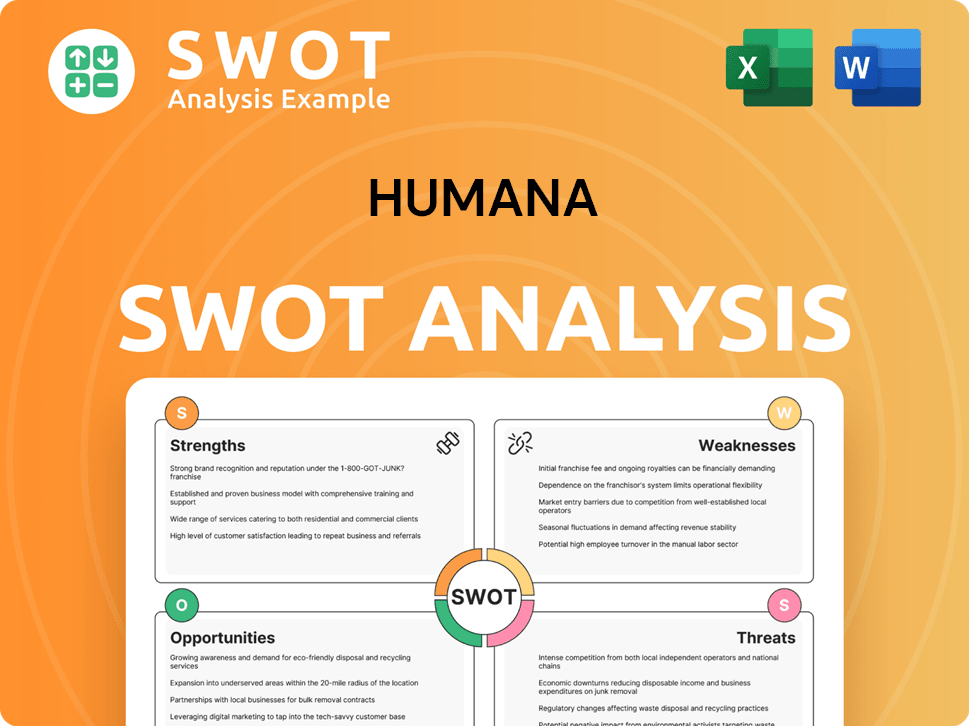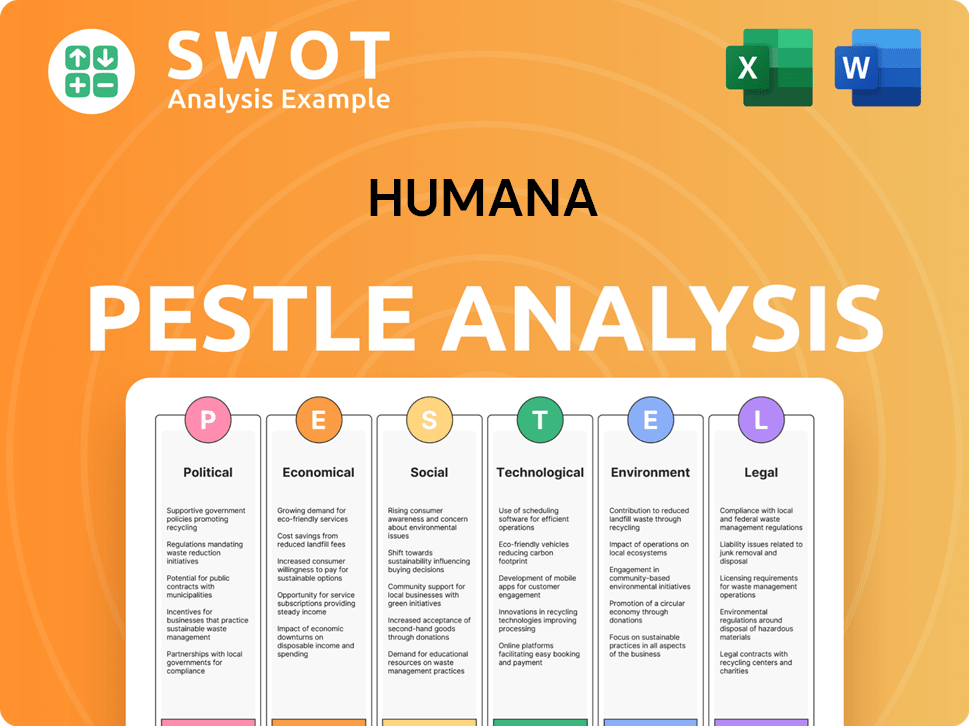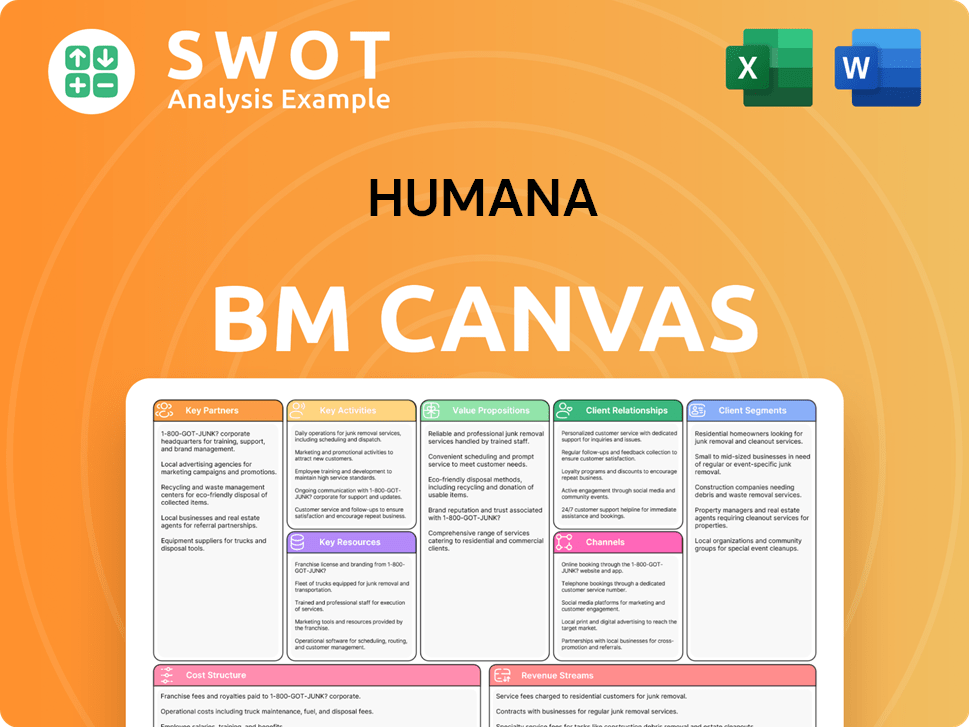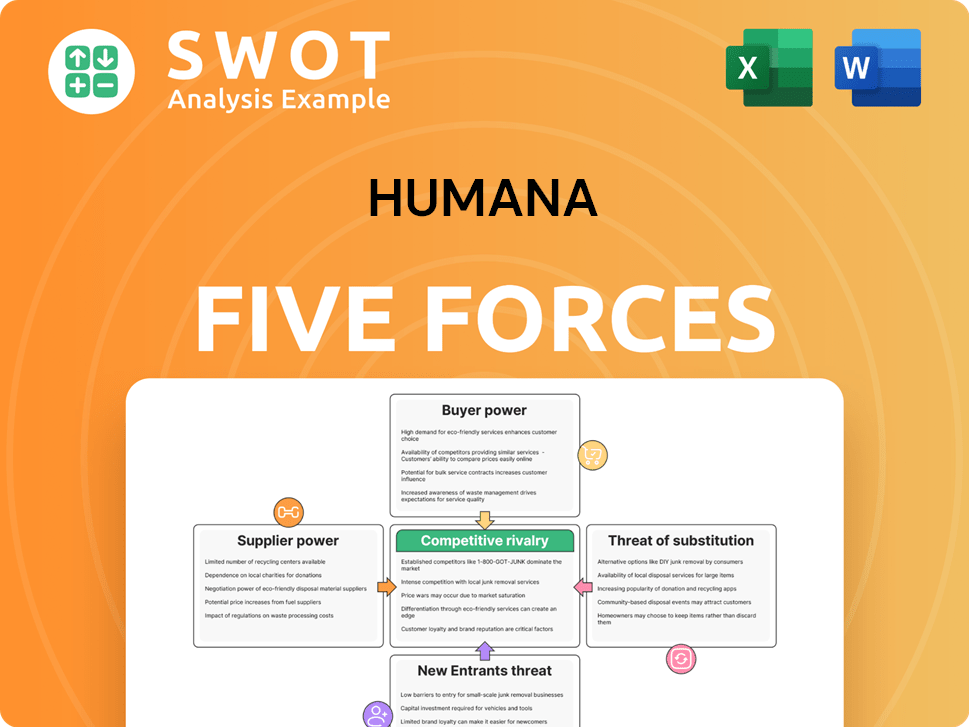Humana Bundle
Who Really Owns Humana?
Uncover the intricate ownership web of Humana Inc., a healthcare giant shaping the future of health insurance. Knowing Humana SWOT Analysis can also help you understand the company's competitive advantages. From its inception to its current status as a Fortune 500 leader, understanding Humana's ownership structure is key to grasping its strategic direction. This exploration is vital for investors, analysts, and anyone interested in the healthcare industry.

The evolution of Humana's ownership, from its founding as Extendicare Inc. to its present-day structure, reveals a fascinating journey. Exploring "Who owns Humana" provides critical insights into the company's governance and long-term objectives, especially considering its significant market capitalization and influence. This article will dissect the key players, including major shareholders and Humana executives, to offer a comprehensive view of this healthcare powerhouse.
Who Founded Humana?
The story of Humana begins in 1961 with its founders, David A. Jones Sr. and Wendell Cherry, two lawyers from Louisville, Kentucky. Initially, the company was established as Heritage House of America Inc., focusing on nursing homes. Their initial investment was modest, with each founder, along with four friends, contributing $1,000 to build the first nursing home.
By 1968, the company, then operating as Extendicare Inc., had become the largest nursing home company in the United States. This early success laid the groundwork for future expansion and strategic shifts. The founders' vision and leadership were crucial in navigating the company through its initial growth phase.
In 1972, Jones and Cherry made a pivotal decision to sell their nursing home chain and venture into hospitals, marking a significant strategic pivot. This shift led to the company's name change to Humana Inc. in 1974, reflecting a new emphasis on healthcare services. This transition highlighted their ability to adapt and seize new opportunities in the evolving healthcare landscape.
Humana Inc. was founded in 1961 by David A. Jones Sr. and Wendell Cherry. The initial investment was a modest $1,000 each from the founders and four friends.
By 1968, the company, known as Extendicare Inc., had become the largest nursing home company in the U.S. This rapid expansion demonstrated early success and strategic foresight.
In 1972, Jones and Cherry sold their nursing home chain to acquire hospitals. This strategic move marked a significant change in the company's direction.
The corporate name changed to Humana Inc. in 1974, reflecting a focus on healthcare services. This name change aligned with the company's new strategic direction.
Jones and Cherry remained at the helm, with Jones serving as chairman until 2005. Their long-term leadership shaped the company's early development.
The acquisition of American Medicorp in 1978 doubled Humana's size. This indicates significant early capital infusion and a drive towards growth.
The early years of Humana ownership were marked by strategic decisions and rapid growth. The founders, David A. Jones Sr. and Wendell Cherry, played a crucial role in shaping the company's direction. The initial focus on nursing homes evolved into a broader healthcare strategy, with acquisitions like American Medicorp significantly expanding the company's reach. To learn more about Humana's growth, consider reading about the Growth Strategy of Humana.
- Humana Inc. was founded in 1961 by David A. Jones Sr. and Wendell Cherry.
- The company initially focused on nursing homes and grew rapidly.
- A strategic shift to hospitals occurred in 1972, leading to the name change in 1974.
- Jones and Cherry's leadership was instrumental in the company's early development.
Humana SWOT Analysis
- Complete SWOT Breakdown
- Fully Customizable
- Editable in Excel & Word
- Professional Formatting
- Investor-Ready Format

How Has Humana’s Ownership Changed Over Time?
The evolution of Humana's ownership reflects its strategic shifts over time. Initially a privately held entity, it transitioned to a publicly traded company listed on the New York Stock Exchange (NYSE: HUM). A pivotal moment occurred in 1993 when Humana spun off its hospital operations into Galen Health Care Inc., focusing exclusively on health insurance. This strategic move significantly altered its asset base and, consequently, its ownership profile.
As of June 2025, Humana ownership is primarily institutional. The shift from private to public ownership and the subsequent focus on health insurance have shaped its current ownership structure, with institutional investors holding the majority of shares. This structure influences the company's strategic direction and financial performance, emphasizing shareholder value.
| Ownership Category | Percentage | Approximate Shares |
|---|---|---|
| Institutional Shareholders | 92.83% | Data Not Available |
| Humana Insiders | 2.30% | Data Not Available |
| Retail Investors | 4.87% | Data Not Available |
The major stakeholders in Humana Inc. include institutional investors who collectively hold a significant portion of the company's shares. These firms, such as Vanguard Group Inc., BlackRock Inc., and Dodge & Cox, manage large portfolios on behalf of their clients. Individual shareholders, like David A. Jones Sr., a co-founder, also maintain a notable stake in the company. These ownership dynamics are crucial to understanding Humana's strategic direction and financial performance. For more details on Humana's business model, you can read about the Revenue Streams & Business Model of Humana.
Humana's ownership is largely institutional, with major stakes held by large asset management firms.
- The shift to public trading and the focus on health insurance have reshaped its ownership structure.
- Institutional investors significantly influence the company's strategic direction.
- Individual shareholders, such as co-founders, also hold significant positions.
- Understanding the ownership structure is key to assessing Humana's financial performance.
Humana PESTLE Analysis
- Covers All 6 PESTLE Categories
- No Research Needed – Save Hours of Work
- Built by Experts, Trusted by Consultants
- Instant Download, Ready to Use
- 100% Editable, Fully Customizable

Who Sits on Humana’s Board?
The current leadership at Humana Inc. includes key figures steering the company. As of early 2025, Kurt J. Hilzinger holds the position of chairman of the board. Jim Rechtin, who became President and Chief Executive Officer on July 1, 2024, also joined the Board of Directors on the same date. Bruce Broussard, the former CEO, transitioned out of his board role on July 1, 2024, but will continue as a strategic advisor until 2026. Celeste Mellet was appointed as the new Chief Financial Officer, effective January 11, 2025, succeeding Susan Diamond, who moved to an advisory role until the end of 2025. Michelle O'Hara joined as Chief Human Resources Officer in January 2025, and Gordon Smith was elected to the Board of Directors on October 23, 2024. This structure reflects Humana's ongoing evolution and strategic direction.
Understanding the dynamics of Humana ownership involves looking at its board and major shareholders. The board's composition and the influence of significant institutional investors are critical. Institutional investors like Vanguard Group Inc., BlackRock Inc., and Dodge & Cox hold substantial equity stakes, giving them considerable voting power. These shareholders typically exercise their influence through proxy voting at annual stockholder meetings, affecting board elections and key corporate decisions. The stability of the board and management structure is notable, with no significant proxy battles or activist investor campaigns reported recently. For more insights into the company's strategic approach, consider reading about the Marketing Strategy of Humana.
| Board Member | Title | Date Joined |
|---|---|---|
| Kurt J. Hilzinger | Chairman of the Board | N/A |
| Jim Rechtin | President and CEO | July 1, 2024 |
| Celeste Mellet | Chief Financial Officer | January 11, 2025 |
| Michelle O'Hara | Chief Human Resources Officer | January 2025 |
| Gordon Smith | Board of Directors | October 23, 2024 |
As a publicly traded company, Humana Inc. generally follows a one-share-one-vote principle, common among major U.S. corporations. This structure ensures that voting power is directly proportional to the number of shares held. The influence of institutional investors is significant, as they collectively hold a substantial portion of the company's shares. These shareholders play a crucial role in shaping the company's direction through their voting rights on matters such as board elections and major corporate actions, reflecting the dynamics of Humana ownership.
The Board of Directors and major shareholders significantly influence Humana's strategic direction.
- Kurt J. Hilzinger serves as Chairman of the Board.
- Jim Rechtin is the President and CEO, joining the board in July 2024.
- Institutional investors like Vanguard and BlackRock hold significant voting power.
- Humana generally adheres to a one-share-one-vote principle.
Humana Business Model Canvas
- Complete 9-Block Business Model Canvas
- Effortlessly Communicate Your Business Strategy
- Investor-Ready BMC Format
- 100% Editable and Customizable
- Clear and Structured Layout

What Recent Changes Have Shaped Humana’s Ownership Landscape?
Recent developments at Humana Inc., including changes in leadership and strategic financial activities, have shaped its ownership profile. Jim Rechtin took over as President and CEO on July 1, 2024, succeeding Bruce Broussard, who transitioned to a strategic advisor role. This transition is part of a plan to accelerate Humana's integrated care strategy. Furthermore, the company has been actively involved in share buyback programs, with a new $3 billion program authorized in February 2024, aiming to enhance shareholder value.
Financial data indicates ongoing share repurchases. In Q1 2024, Humana repurchased $701.61 million in shares, followed by $47.96 million in Q2 2024 and $430.74K for the period ending September 29, 2024. As of March 31, 2025, share buybacks for HUM stock were $9 million. These actions reflect Humana's efforts to manage its capital structure and provide returns to investors. The institutional presence is strong, with institutional investors holding 98.98% of shares in April 2025.
| Metric | Data | Date |
|---|---|---|
| Institutional Ownership | 98.98% | April 2025 |
| Insider Holdings | 0.15% | April 2025 |
| Mutual Fund Ownership | 72.88% | April 2025 |
| Share Buybacks (Q1 2024) | $701.61 million | Q1 2024 |
| Share Buybacks (Q2 2024) | $47.96 million | Q2 2024 |
The ownership structure of Humana is also influenced by its strategic focus on home health. As of January 2025, Humana has a diversified structure across its 487 facility affiliates. This strategic approach includes full ownership of 252 facilities, partial ownership in 6 facilities, and smaller stakes in 228 facilities. Looking ahead, Humana anticipates a reduction in individual Medicare Advantage membership, while focusing on its Medicaid and CenterWell strategies. For more insights, you can explore the target market of Humana.
Jim Rechtin became President and CEO on July 1, 2024, succeeding Bruce Broussard.
A new $3 billion share repurchase program was authorized in February 2024.
Institutional investors held 98.98% of Humana's shares in April 2025.
As of January 2025, Humana has a diversified structure across its 487 facility affiliates.
Humana Porter's Five Forces Analysis
- Covers All 5 Competitive Forces in Detail
- Structured for Consultants, Students, and Founders
- 100% Editable in Microsoft Word & Excel
- Instant Digital Download – Use Immediately
- Compatible with Mac & PC – Fully Unlocked

Related Blogs
- What are Mission Vision & Core Values of Humana Company?
- What is Competitive Landscape of Humana Company?
- What is Growth Strategy and Future Prospects of Humana Company?
- How Does Humana Company Work?
- What is Sales and Marketing Strategy of Humana Company?
- What is Brief History of Humana Company?
- What is Customer Demographics and Target Market of Humana Company?
Disclaimer
All information, articles, and product details provided on this website are for general informational and educational purposes only. We do not claim any ownership over, nor do we intend to infringe upon, any trademarks, copyrights, logos, brand names, or other intellectual property mentioned or depicted on this site. Such intellectual property remains the property of its respective owners, and any references here are made solely for identification or informational purposes, without implying any affiliation, endorsement, or partnership.
We make no representations or warranties, express or implied, regarding the accuracy, completeness, or suitability of any content or products presented. Nothing on this website should be construed as legal, tax, investment, financial, medical, or other professional advice. In addition, no part of this site—including articles or product references—constitutes a solicitation, recommendation, endorsement, advertisement, or offer to buy or sell any securities, franchises, or other financial instruments, particularly in jurisdictions where such activity would be unlawful.
All content is of a general nature and may not address the specific circumstances of any individual or entity. It is not a substitute for professional advice or services. Any actions you take based on the information provided here are strictly at your own risk. You accept full responsibility for any decisions or outcomes arising from your use of this website and agree to release us from any liability in connection with your use of, or reliance upon, the content or products found herein.